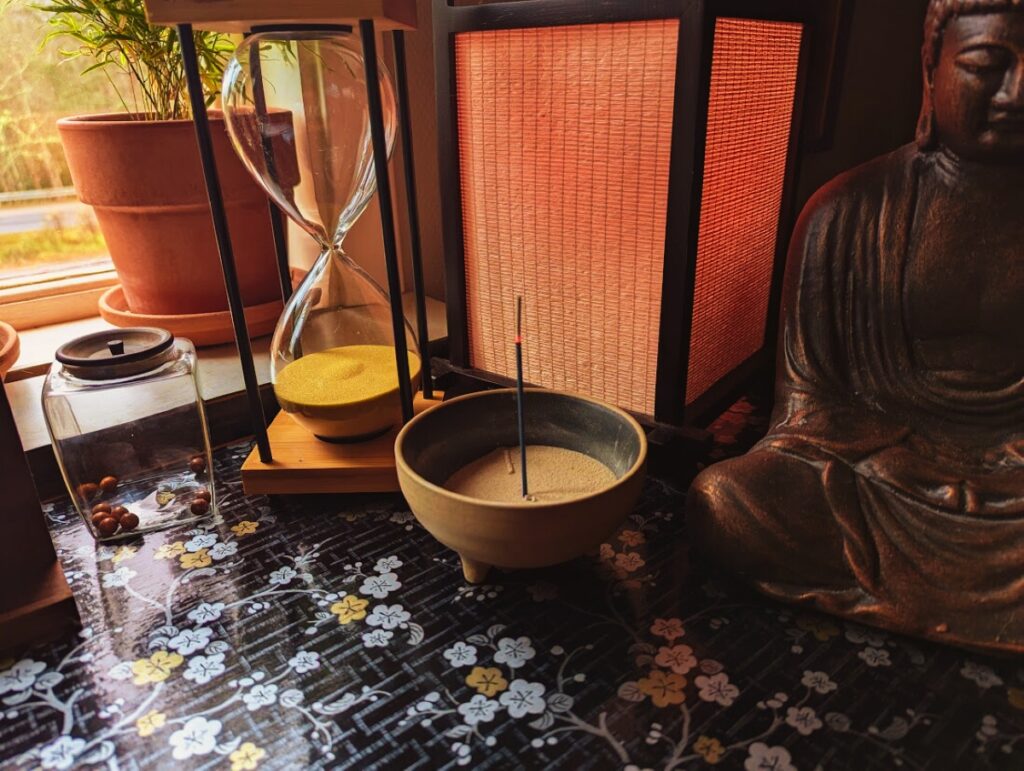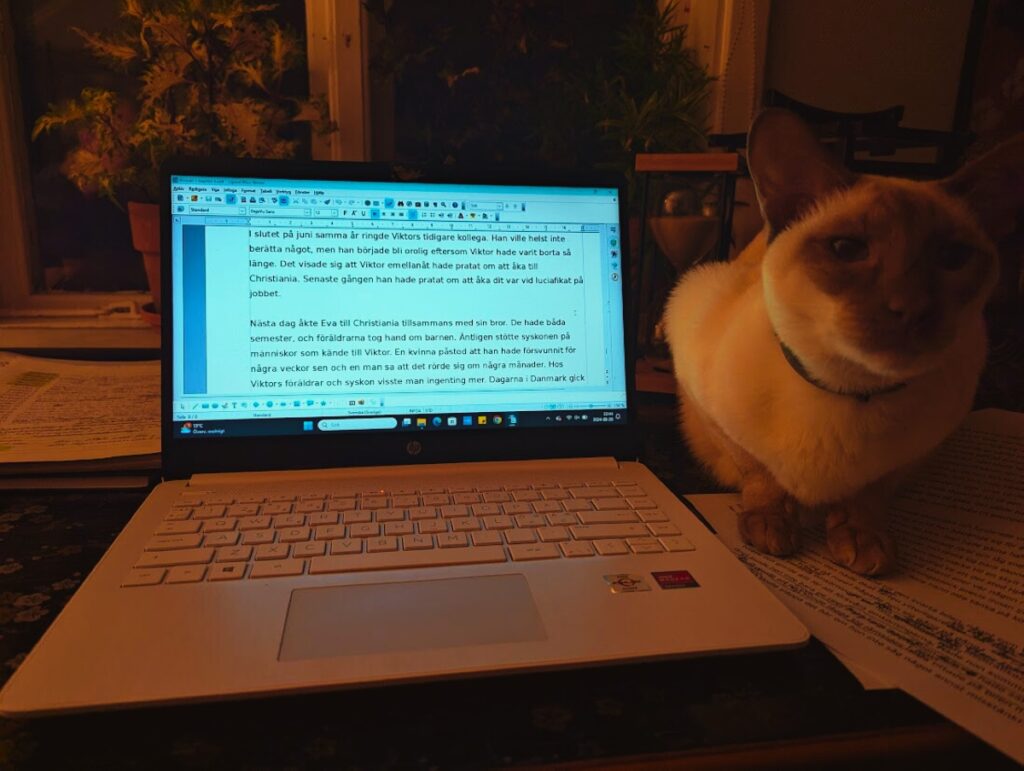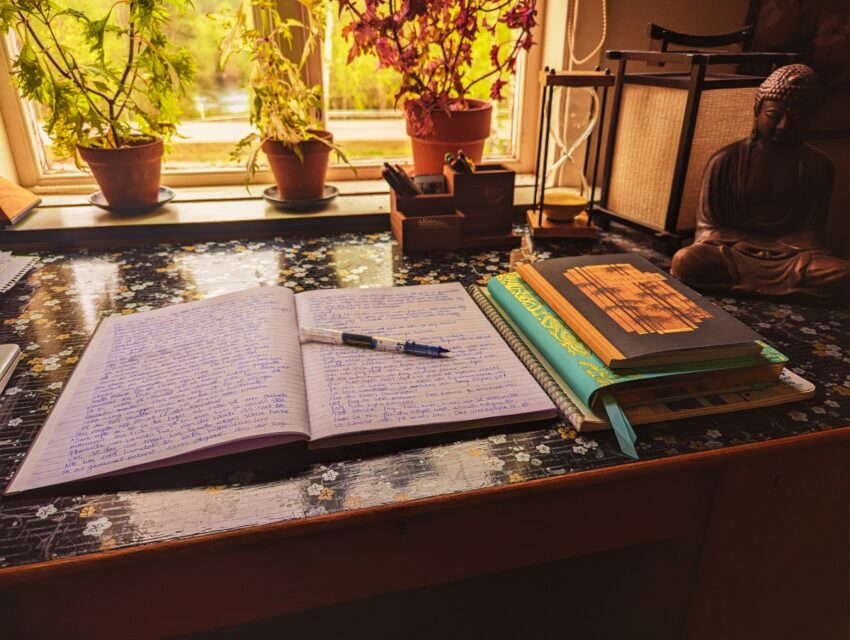In Search of the Perfect Writing Routine
Creating a writing routine that works in the long run is an art. When striving for change, the goal is to make it as lasting and straightforward as possible—almost second nature. That’s what we all dream of. I’ve thought a lot about this and want to share my ongoing process of finding the perfect writing routine.
It Started with the Place
For me, the most crucial part is the place—in my case, my desk. The luxury of being able to close the door and work uninterrupted is invaluable. We’re all different, but I’ve realized that I write best without any background music. I like to take micro-breaks by looking out the window. I can write in other places, but there’s something special about my desk.
Things That Inspire
To make writing more enjoyable, I’ve bought a few nice items for my desk. I have a quality pen holder with premium pens. I bought an hourglass last fall; the gold-colored sand runs for an hour, reminding me not to sit too long without a break. A rice paper lamp casts a soft glow, and with a remote, I can change the light color. Sometimes I light incense; I’m particularly fond of Aqua from Nippon Kodo right now. It’s nice to have a cup of tea or a soft drink while working. The key is to create the right atmosphere.

Time and Energy
Finding time for writing can be tough when there’s so much else that needs to be done. After deleting my Facebook account this spring, I noticed I had a lot more time and energy. I’d like to delete Instagram too, but I need a platform besides this blog to reach out and share updates.
This blog motivates me to keep writing. I wouldn’t enjoy running it for ten years without publishing my book. The writing itself will be more enjoyable the further along I get with the book, so I feel I’m on the right path.
Scheduling Writing Sessions
I’ve just started scheduling writing sessions three times a week. If nothing special comes up, I’ll write on Mondays, Wednesdays, and Fridays. My goal is to increase this to five days a week, but first, I want to manage three days for an extended period, then try four days to see how it goes. Perhaps I’ll feel better writing three days a week and doing other things on the remaining days.
Another option could be to concentrate my writing into three intense days in a row. On those days, I could skip reading and watching TV, making it easier to focus on writing. I’ll just have to experiment to find the right balance.
Reward System
Rewards are fascinating too. They say rewards are essential for achieving goals. My latest addition to my writing routine is a reward system. After each completed writing session, I’ll put a wooden bead in a jar. I plan to take this seriously starting next year to see exactly how many times I write annually.
The plan is to trade in the beads for something at the end of the year, with each bead representing a certain value, or to reward myself after collecting ten beads. Or maybe it’s enough motivation to simply see the beads accumulating in the jar and know I’ve done a good job so many times. I believe that seeing progress so concretely can be motivating. I’ll review this system in January 2026.

Further Fine-Tuning
I’ve thought a lot about why I haven’t written as much as I could, even though the conditions were good. I’ve always enjoyed writing, and I realized that a big part of this enjoyment comes from writing by hand. I started reading about the benefits of writing by hand, bought notebooks and pens, and began drafting. It went wonderfully. That’s how I think best. When I transcribe the draft to the computer, it flows smoothly; it’s just a matter of filling in. I love the combination of handwriting and typing.
Writing a Book Requires More Thought
Sometimes I think it takes longer to write by hand, but it actually takes me more time to sit exclusively at the computer. I think there’s a different kind of pressure when sitting in front of the computer. Writing shorter texts, like this blog post, feels easier to do directly on the computer. Writing a book is something else. It’s bigger, deeper, and more enduring. It requires more thought, and I love how I think with pen and paper.
Experimenting with Dictation
A few weeks ago, I had another insight. I was sick for an extended period and missed writing, but concentrating on my notebook or the computer felt too exhausting. I wondered how I might keep working even on days when I don’t feel well.
That’s when I thought of dictation. So I picked up my phone and dictated a scene for the book, and was surprised at how well the transcription turned out. Editing will still be necessary to refine and perfect the text. Dictation is something I want to explore further. Maybe I can dictate some parts of the book, or even large sections? I’ll try dictating a few chapters and see how it feels. Testing different methods and evaluating them is very fun. Eventually, I’ll find the perfect writing routine.


